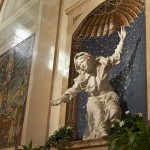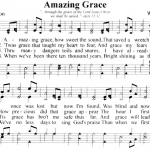Last weekend, while I was in New Haven, I had the pleasure of getting to hear a hymn I particularly liked at Mass and got a bit verklempt while singing it. Somehow, I’d misremembered just enough of the lyrics of Marty Haugen’s “Awake, O Sleeper” that I hadn’t been able to track it down on Google, til I got a refresher. (Humming it brokenly at people had done no good either). Here are the lyrics of the chorus:
Awake, O sleeper. Arise from death.
Abandon the shadows of the night.
The wind of the Spirit will be your breath,
and Christ will fill you with light.
There’s an echo of Plato’s cave here, where we’re called out of a living death we mistook for the fullness of joy. We’re placed in a similar position to the paralytic in the fifth chapter of the Gospel of John:
Now in Jerusalem by the Sheep Gate there is a pool, called in Hebrew Beth-zatha, which has five porticoes. In these lay many invalids—blind, lame, and paralyzed. One man was there who had been ill for thirty-eight years.
When Jesus saw him lying there and knew that he had been there a long time, he said to him, “Do you want to be made well?”
The sick man answered him, “Sir, I have no one to put me into the pool when the water is stirred up; and while I am making my way, someone else steps down ahead of me.”
Jesus said to him, “Stand up, take your mat and walk.”
At once the man was made well, and he took up his mat and began to walk.
In John’s verse, Christ heals a man of his earthly wound. The paralytic can contrast his physical state with that of people around him, and long for more. But, as described by the hymn, we’re a little more like a paralytic who had never imagined walking, until healing was already upon him. Like Dante in The Divine Comedy, we’re led slowly up the path of love, by whichever pole star we can follow without being blinded, until our eyes have grown stronger. Or, if you like your examples a little heavier on adorable than adoration, we’re like the girl in the video below, who couldn’t imagine the joy of discovering rain before it fell.
For me, this hymn and these ideas connect with the Ignatian idea of discernment through spiritual consolation and desolation. It helps make it possible to find consolation, and a path back to grace, even when I am mired in anger, contempt, and sin. I’m not kind enough to know what it would be like to be healed of these habits, but I can, through a kind of via negativa, desire whatever that wholeness would resemble. Thinking about whether an action or attitude belongs to death or to life, and what I could do to move away from the shadows of night helps me find small ways to cooperate with saving grace. And it helps me feel more agape for my friends.
When I was singing the hymn at Mass, one reason I was teared up is that I was thinking of some of the kindness and virtues of particular friends, and feeling a little overwhelmed by the thought that the loveliness of character they exhibited was just the beginning of what each of us could offer, if we took up the vocation of sainthood. It made every act of love feel very precious, a small flame I wanted to help kindle and stoke into its full light.












